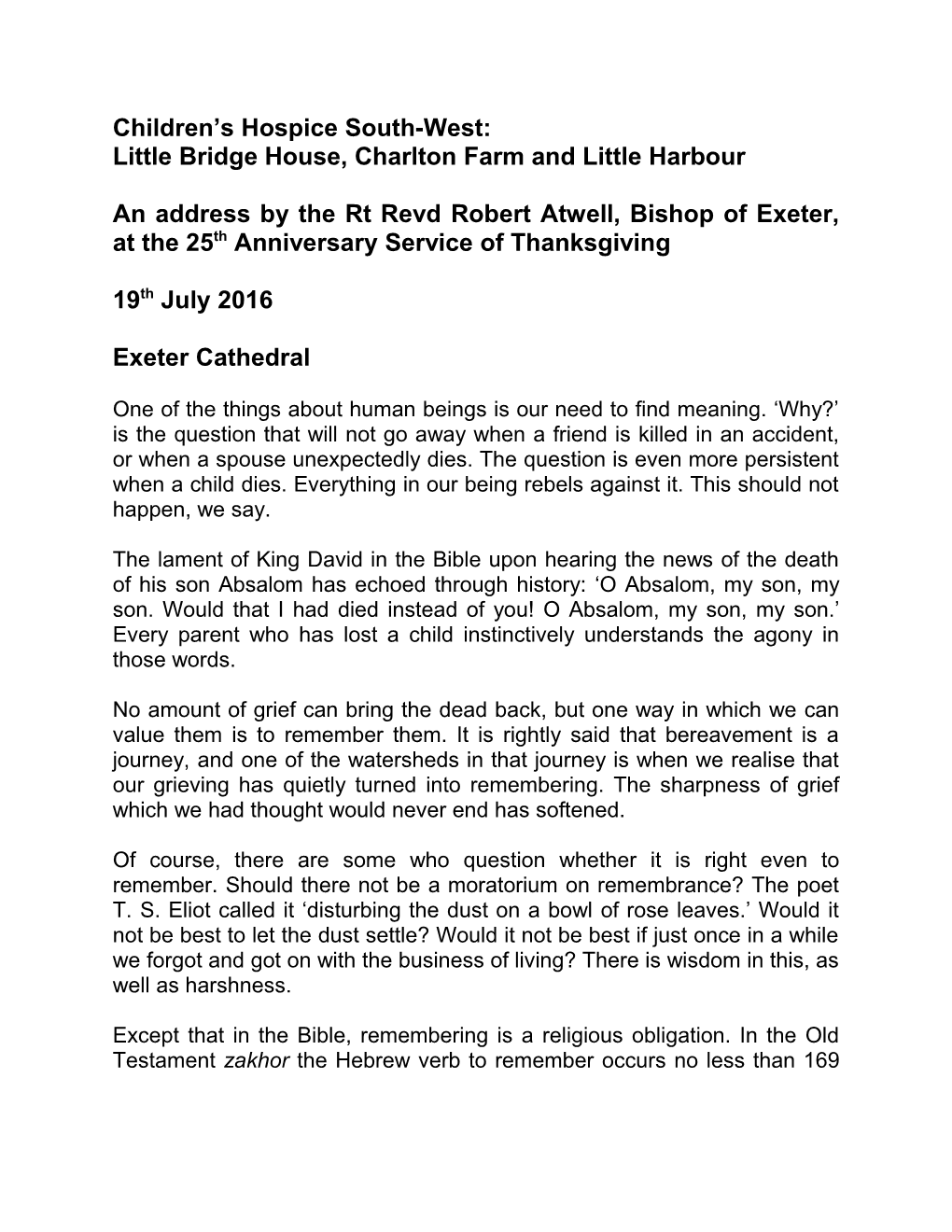Children’s Hospice South-West:
Little Bridge House, Charlton Farm and Little Harbour
An address by the Rt Revd Robert Atwell, Bishop of Exeter, at the 25th Anniversary Service of Thanksgiving
19th July 2016
Exeter Cathedral
One of the things about human beings is our need to find meaning. ‘Why?’ is the question that will not go away when a friend is killed in an accident, or when a spouse unexpectedly dies. The question is even morepersistent when a child dies. Everything in our being rebels against it. This should not happen, we say.
The lament of King David in the Bible upon hearing the news of the death of his son Absalom has echoed through history: ‘O Absalom, my son, my son. Would that I had died instead of you! O Absalom, my son, my son.’Every parent who has lost a child instinctively understands the agony inthose words.
No amount of grief can bring the dead back, but one way in which we can value them is to remember them. It is rightly said that bereavement is a journey, and one of the watersheds in that journey is when we realise that our grieving has quietly turned into remembering. The sharpness of grief which we had thought would never end has softened.
Of course, there are some who question whether it is right even to remember. Should there not be a moratorium on remembrance?The poet T. S. Eliot called it ‘disturbing the dust on a bowl of rose leaves.’Would it not be best to let the dust settle? Would it not be best if just once in a while we forgot and got on with the business of living?There is wisdom in this, as well as harshness.
Except that in the Bible, remembering is a religious obligation. In the Old Testamentzakhorthe Hebrew verb to remember occurs no less than 169 times. It may surprise you to know that the most frequent commandment in the Bible is not ‘Thou shalt not do this or that’ but ‘Remember’.
So if I had a text for today, it would not be from today’s readings, wonderful though they are, but from the Book of Deuteronomy. The words were spoken by Moses to the people of Israel as they left the wilderness and prepared to cross the River Jordan into the Promised Land:
‘Watch yourselves closely, so as neither to forget the things that your eyes have seen nor to let them slip from your minds all the days of your life; make them known to your children and your children’s children.’ (Deuteronomy 4. 9)
The point is we human beings need to remember. It’s one of the things that makes us human. If we don’t remember we become detached from the story of our lives and lose our bearings. It is no accident that at the heart of Little Bridge House stands the Memory Tree, its branches festooned with the pictures and memories of so many loved children who died before their time.
So inevitably on this 25th anniversary we find ourselves lamenting and sad, but also cherishing happy memories and full of thanksgiving: thanks for the outstanding work of our Children’s Hospices in the South-West; and above all, thanks for the precious gift of life. Life itself is the breath of God and we easily take it for granted.
Sixty years ago there were only two hospices in the whole country and both were in London: St Joseph’s Hospice in the East End, and St Christopher’s Hospice in Sydenham, founded by the indomitable Cicely Saunders.Sixty years ago the thought that there might be a need for a network of specialist children’s hospices in England wasn’t on the radar, and sadly at the forefront of the resistance movement was sometimes a suspicious medical profession.
But all that has changed and it is largely thanks to the pioneering work of hospices such as our own here in the south-west. Today there is a more holistic attitude to the care of terminally ill children and young people, and we thank God for it. To face the crisis of a terminally ill child is one thing, but to face it alone is quite another. Our hospice movement ensures that no family need face these things alone.
So we give thanks for 25 years of generous service to families and communities across the region. We give thanks for the vision and imagination of those who built our hospice network. We give thanks for our patron, for donors, fundraisers and benefactorsand all who continue to fund its outreach. We give thanks for those who work in our children’s hospice, whether as medical staff, counsellors, chaplains, support staff or volunteers.
Above all, we rejoice in the crown of friendship that surroundsLittle Bridge House, Charlton Farm and Little Harbour. Their staff and volunteers are the human faces of the divine reality that tells us we are not alone.
‘For I am convinced,’ says St Paul writing to the Romans, ‘that neither death, nor life, nor angels, nor rulers, nor things present, nor things to come, nor powers, nor height, nor depth, nor anything else in all creation, will be able to separate us from the love of God in Christ Jesus our Lord.’
I share St Paul’s conviction. And it is in the faith that nothing can separate us from the love of God, a God who in Christ gathers up the fragments of our lives, including those of our children, so that nothing is lost, that we make our prayer today.May that prayer be our hope and inspiration for the next 25 years.
+ Robert Exon
